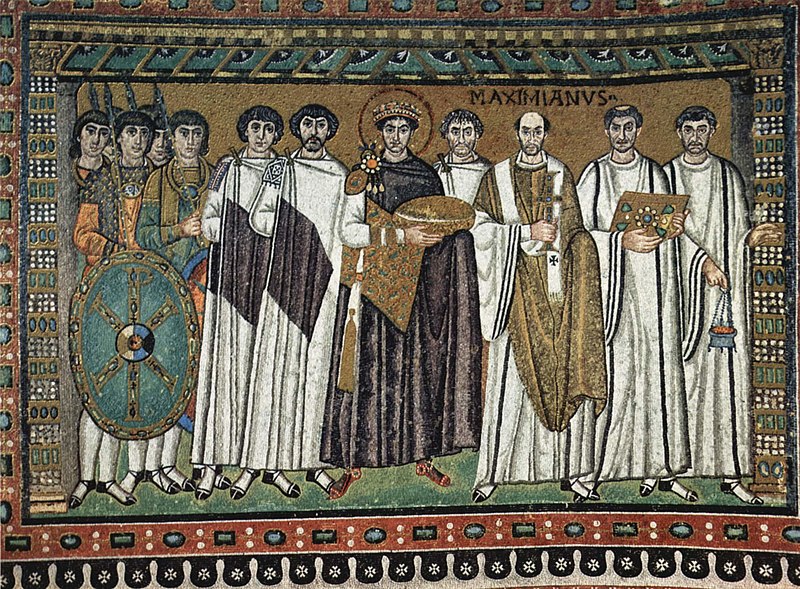Christmas or Xmas
Posted by: Manni on 24 December 2008
I am a little bit confused.
On Christmas we celebrate the birth of Jesus Christ.
Who is X in Xmas?
Manfred
On Christmas we celebrate the birth of Jesus Christ.
Who is X in Xmas?
Manfred
Posted on: 24 December 2008 by JWM
The 'X' is in fact the x-looky-likey Greek letter 'chi' (pronounced 'kai') the first letter of the title 'Christos' - Christ ('anointed one'), the New Testament Greek equivalent of the Hebrew word Messiah.
Posted on: 24 December 2008 by MilesSmiles
quote:Originally posted by JWM:
The 'X' is in fact the x-looky-likey Greek letter 'chi' (pronounced 'kai') the first letter of the title 'Christos' - Christ ('anointed one'), the New Testament Greek equivalent of the Hebrew word Messiah.
You covered it all -thread closed.
Posted on: 25 December 2008 by Manni
quote:Originally posted by JWM:
The 'X' is in fact the x-looky-likey Greek letter 'chi' (pronounced 'kai') the first letter of the title 'Christos' - Christ ('anointed one'), the New Testament Greek equivalent of the Hebrew word Messiah.
Thank you for the precise explanation.
Nevertheless I prefer the word Christmas. As a Christian ( not Xian ) I believe in Jesus Christ ( not J. X ). It is doubtful, whether members of other religions would accept such a shortened form of their Gods name.
Best wishes
Manfred
Posted on: 26 December 2008 by zorba
Unfortunately today Christmas is a time and title used by the chainstore monopolies and the like to make more money and stress the public, forcing bigger spend and bigger debt all in the name of Jesus Christ.
The true meaning left a long time ago.
X is pronounced 'chi' in Greek with a silent 'c' and is the first letter as JWM describes but I do not see how it fits into Xmas apart from card companies looking for some kind of excuse to use less ink on their cards and make more money.
In Greece there is no short for Christ or Christmas it is taken with meaning and although the younger generation do not go to church as much as the scientific age is leaving Christianity behind Greece is still a stronghold for Christianity.
In Greece there are no Christmas presents on Christmas Day they are given on New Years Day as January 1st is also St Nicholas Day - but I can see why we give presents on Christmas Day as it is to symbolise the gifts given to Christ by the 3 wise men.
Best Wishes
The true meaning left a long time ago.
X is pronounced 'chi' in Greek with a silent 'c' and is the first letter as JWM describes but I do not see how it fits into Xmas apart from card companies looking for some kind of excuse to use less ink on their cards and make more money.
In Greece there is no short for Christ or Christmas it is taken with meaning and although the younger generation do not go to church as much as the scientific age is leaving Christianity behind Greece is still a stronghold for Christianity.
In Greece there are no Christmas presents on Christmas Day they are given on New Years Day as January 1st is also St Nicholas Day - but I can see why we give presents on Christmas Day as it is to symbolise the gifts given to Christ by the 3 wise men.
Best Wishes
Posted on: 26 December 2008 by JWM
No, I'm not sure that many 'practising' Christians of the West would use 'Xmas' over 'Christmas' either. Nevertheless, the etimology is the 'chi'.
Whilst it may be that there are no shortened forms of 'Christ' in popular Greek culture, historically there are. Classical icons, for example, bear the shortened form 'IC XC', such as:

Other examples would be the early Christian symbols of (the most well-known) the fish and the 8-spoked wheel, both of which are based on the Greek word for fish, Ichthus (ΙΧΘΥΣ), which was used as an acrostic, with each letter standing for a word in a message: Ἰησοῦς Χριστός, Θεοῦ Υἱός, Σωτήρ (Iēsous Khristos Theou Huios, Sōtēr) = "Jesus Christ, Son of God, Saviour".

Societies of Christians in Hellenistic Greece and Roman Greece, prior to the Edict of Milan which legalised Christianity from the early AD300s, protected their congregations by keeping their meetings secret. In order to point the way to ever-changing meeting places, they developed a symbol which adherents would readily recognize, and which they could scratch on rocks, walls and the like, in advance of a meeting. (At the time, a similar symbol was used by Greeks to mark the location of a funeral, so using the ichthys was a good cover).
In Ephesus, a very early Christian site, there is also the symbol of the 8-spoked wheel, in which the shapes of all the letters of ΙΧΘΥΣ are contained.

(The 'wheel' is ancient carving. The orange chalk writing is modern vandalism )
)
Another ancient abbreviation is the XP ('chi-rho'), the first letters of 'Christos', used in various forms - XP side-by-side, an overlaid X and P, or - more stylisted - an overlaid + and P.

The XP was one of the earliest cruciform Christian symbols, and was used, famously, by the Emperor Constantine I at the Battle of the Milvian Bridge.

Mosaic in the Basilica Church of San Vitale, Ravenna.
Whilst it may be that there are no shortened forms of 'Christ' in popular Greek culture, historically there are. Classical icons, for example, bear the shortened form 'IC XC', such as:

Other examples would be the early Christian symbols of (the most well-known) the fish and the 8-spoked wheel, both of which are based on the Greek word for fish, Ichthus (ΙΧΘΥΣ), which was used as an acrostic, with each letter standing for a word in a message: Ἰησοῦς Χριστός, Θεοῦ Υἱός, Σωτήρ (Iēsous Khristos Theou Huios, Sōtēr) = "Jesus Christ, Son of God, Saviour".

Societies of Christians in Hellenistic Greece and Roman Greece, prior to the Edict of Milan which legalised Christianity from the early AD300s, protected their congregations by keeping their meetings secret. In order to point the way to ever-changing meeting places, they developed a symbol which adherents would readily recognize, and which they could scratch on rocks, walls and the like, in advance of a meeting. (At the time, a similar symbol was used by Greeks to mark the location of a funeral, so using the ichthys was a good cover).
In Ephesus, a very early Christian site, there is also the symbol of the 8-spoked wheel, in which the shapes of all the letters of ΙΧΘΥΣ are contained.

(The 'wheel' is ancient carving. The orange chalk writing is modern vandalism
Another ancient abbreviation is the XP ('chi-rho'), the first letters of 'Christos', used in various forms - XP side-by-side, an overlaid X and P, or - more stylisted - an overlaid + and P.

The XP was one of the earliest cruciform Christian symbols, and was used, famously, by the Emperor Constantine I at the Battle of the Milvian Bridge.

Mosaic in the Basilica Church of San Vitale, Ravenna.
Posted on: 26 December 2008 by Exiled Highlander
JWM
Damn, you beat me to it!
Jim
Damn, you beat me to it!
Jim
Posted on: 26 December 2008 by zorba
JWM,
Thanks, a very informative short lesson.
Regards
zorba
Thanks, a very informative short lesson.
Regards
zorba
Posted on: 27 December 2008 by Manni
JWM,
thank you very much for a very interesting trip into history.
I did not know this before, the same applies probably to most of the Xmas advocates .
.
Best wishes
Manfred
thank you very much for a very interesting trip into history.
I did not know this before, the same applies probably to most of the Xmas advocates
Best wishes
Manfred
Posted on: 27 December 2008 by Florestan
Manni,
Thanks for asking a very good question here and thanks to JWM especially for your detailed response. This day is not lost and it is a good day now since I have learned at least one new thing today!
I've often wondered about this question myself. I now understand and believe that JWM's response is technically and historically correct. It finally explains to me its derivation and beginnings but I still wonder if that applies to us today. How many people today actually know this? I suspect people today who write "XMas" mostly do so because a) they are lazy (it's quicker to do & shorter) or b) they do not want to acknowledge the religious connotations associated with one of the most important Christian events (and I say this based on actual people I know). Although, it seems the latter group now has mostly adopted the "Happy Holidays" generic phrase to just avoid the reference period.
Regards,
Doug
Thanks for asking a very good question here and thanks to JWM especially for your detailed response. This day is not lost and it is a good day now since I have learned at least one new thing today!
I've often wondered about this question myself. I now understand and believe that JWM's response is technically and historically correct. It finally explains to me its derivation and beginnings but I still wonder if that applies to us today. How many people today actually know this? I suspect people today who write "XMas" mostly do so because a) they are lazy (it's quicker to do & shorter) or b) they do not want to acknowledge the religious connotations associated with one of the most important Christian events (and I say this based on actual people I know). Although, it seems the latter group now has mostly adopted the "Happy Holidays" generic phrase to just avoid the reference period.
Regards,
Doug
Posted on: 27 December 2008 by TomK
I've no issue with Xmas although I don't tend to use it myself but what about "Crimbo"? When did that become so common? I find it quite offensive.
Posted on: 27 December 2008 by winkyincanada
I'm with Doug. "Xmas" is used because of laziness or because of a desire to distance oneself from the religious connotations. I use "Xmas" for both reasons - but my laziness is not because I don't want to type "Christmas" but because I couldn't be bothered dreaming up a secular term for "the holiday season" that is briefer than "Xmas". I would never use ther term "Christmas" because I am generally disgusted by organised religion and am keen not confer any unwarranted credibility (as evidenced in other posts).
Posted on: 28 December 2008 by JWM
Sorry mate, to retain any credibility as an atheist, you're just going to have to get writer's cramp and call it 'Winterval' or similar - write 'Xmas', and it still means 'Christmas'.
Posted on: 28 December 2008 by jon h
Credibility? According to the pope, I'm a bigger evil to mankind than global warming. Or somesuch loving, all-inclusive christmassy cheer. 
Posted on: 28 December 2008 by Chalshus
Posted on: 28 December 2008 by winkyincanada
quote:Originally posted by JWM:
Sorry mate, to retain any credibility as an atheist, you're just going to have to get writer's cramp and call it 'Winterval' or similar - write 'Xmas', and it still means 'Christmas'.
Yeah, you're right....but my credibility was shot long ago. Funny thing about atheism though is that as it is characterised as an absence of irrational belief, you don't actually need any particular credibility. You know, what credibility do you need to not believe in gnomes or orbiting teapots?
Posted on: 28 December 2008 by JWM
Here we bloody go again. To save the bother, why not just link through to one of the other previous tedious threads?
(Presumably you've also given into your conscience and worked these past days rather than take any public holidays that derive from religious observance. Or holidays at all, since they derive from holy days. Bah, humbug.)
(Presumably you've also given into your conscience and worked these past days rather than take any public holidays that derive from religious observance. Or holidays at all, since they derive from holy days. Bah, humbug.)
Posted on: 28 December 2008 by Chillkram
quote:Originally posted by jon honeyball:
According to the pope, I'm a bigger evil to mankind than global warming.
He must have heard your (mwah ha ha) evil laugh, Jon!
Posted on: 28 December 2008 by winkyincanada
quote:Originally posted by JWM:
Here we bloody go again. To save the bother, why not just link through to one of the other previous tedious threads?
(Presumably you've also given into your conscience and worked these past days rather than take any public holidays that derive from religious observance. Or holidays at all, since they derive from holy days. Bah, humbug.)
Yeah, I thought that too. "Here we go again". I'll stop now. To be fair though, my "previous tedious thread(s)" did generate some discussion. It's not just me monologuing. You don't have to read them.
Apologies for upsetting or boring you..
